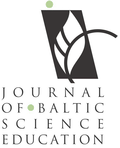A PERSONAL REFLECTION ON COVID-19 ONLINE TEACHING, LEARNING, AND ASSESSMENT WITH SUGGESTIONS FOR RESEARCH
| Title | A PERSONAL REFLECTION ON COVID-19 ONLINE TEACHING, LEARNING, AND ASSESSMENT WITH SUGGESTIONS FOR RESEARCH |
| Publication Type | Journal Article |
| Year of Publication | 2022 |
| Authors | Plessis, AD |
| Journal | Journal of Baltic Science Education |
| Volume | 21 |
| Issue | 4 |
| Start Page | 536-544 |
| Pagination | Continuous |
| Date Published | August/2022 |
| Type of Article | Editorial |
| ISSN | 1648-3898 |
| Other Numbers | E-ISSN 2538-7138 |
| Keywords | Covid-19 pandemic, learning management systems, online learning |
| Abstract | COVID-19 had a severe impact on teaching and learning in schools and tertiary education institutions. Human Rights Watch (Impact of Covid-19 on Children’s Education in Africa, 2022) posits that due to the closure of many schools in African countries, a significant majority of learners were excluded from continuing their education as learning and teaching halted. The pandemic has also had its effect on the higher education sector within the South African context, however, data about non-attendance and drop-out seems not to be freely available as revealed by searching online. Nonetheless, it is reasonable to assume that there were drop-outs and non-attendance by students, however, not to the same extent as within schools as universities embarked on contingency plans to minimize dropouts. Nelson Mandela University in Gqeberha South Africa where the author of this editorial resides, implemented contingency plans within weeks of the COVID pandemic outbreak to offer students ICT devices on loan, e.g. by debiting it against their student accounts while Wi-Fi data access was secured through collaboration with internet providers. It appears that the university sector was able to be more proactive than schools, which can probably be attributed to the fact that the majority of universities have their own ICT infrastructures. In addition, many modules incorporated the use of ICT in various ways, including the use of learning management systems such as Moodle or similar. This resulted in many universities being better prepared to embrace the opportunity to extend online teaching, learning, and assessment in various forms during the COVID-19 pandemic. |
| URL | https://oaji.net/articles/2022/987-1662186470.pdf |
| DOI | 10.33225/jbse/22.21.536 |
| Refereed Designation | Refereed |
| Full Text |
